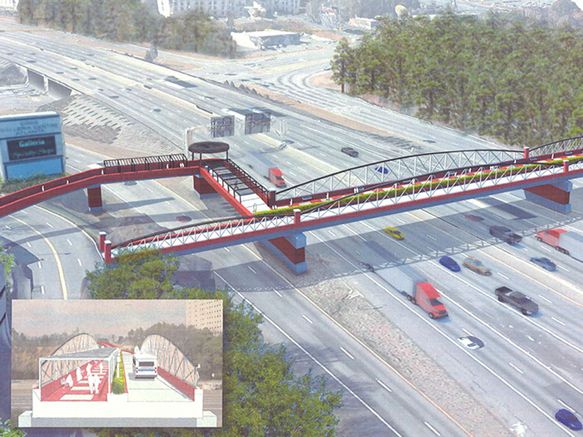When the Braves announced they were leaving Atlanta for suburban Cobb County in 2013, logistically it seemed to make some sense. After all, the new stadium site is more centrally located in relation to the highest concentration of fans who attend games.

But it turns out that relocating a sports stadium to a sprawling, car-dependent area is really tough -- because of the enormous infrastructure outlays necessary to transport thousands of people to the same place by car.
After putting $400 million in public money into attracting the Braves, Cobb County officials are having an embarrassingly hard time getting the site ready for opening day.
The location for the new field is right by the nexus of two enormous highways, I-75 and I-285, and it is bound to the southwest by the Cobb Parkway -- another giant, high-speed road.
Somehow, "neither the Braves nor the county has released any information about its plans for traffic control, pedestrian safety, or parking," the Atlanta Journal Constitution reports.
Problem is, there's not enough room for everyone to park right near the stadium. There are, however, about 2,000 parking spaces and a bus hub just across I-285.
Walking can't be completely eliminated from the stadium planning -- all those people still have to cross the highway on foot. So Cobb County will construct a foot bridge over I-285 for $9 million.
But county officials recently announced that the bridge project would be delayed for at least a year and won't be open in time for the Braves' first season at SunTrust Park. That was after the Georgia Department of Transportation refused to help fund the project.
According to the Atlanta Journal Constitution, additional costs kept piling up for the bridge. But officials never revised their $9 million estimate upwards, leading one county government observer to call it the "magic bridge." Cobb County commissioners have said they are going to pay for it using sales tax funds approved by voters last year, but it's not clear that would be allowed under the terms of the ballot measure.
Getting desperate, Cobb County Commissioner Bob Ott recently suggested that as an alternative to the bridge the county could reconstruct I-285 to run under the Cobb Parkway.
Meanwhile, just this week, Cobb County officials said they would spend $1.2 million annually operating circulator buses through the area, a decision critics panned as a taxpayer subsidy for the Braves. But without the bridge, buses would have to go out of their way and sit in heavy freeway traffic.
Ashley Robbins, a former Atlantan who maintains the transit blog MARTA Rocks!, says the Braves and Cobb County are headed for a mess of their own making.
"Part of their rationale for their move was that there wasn’t sufficient transit to Turner Field," she said. But "a significant number of people actually took transit to the games."
"We’re taking the most congested, most traversed roads in Atlanta and we’re dropping a sports complex right in the middle of it. It’s going to be a nightmare."





